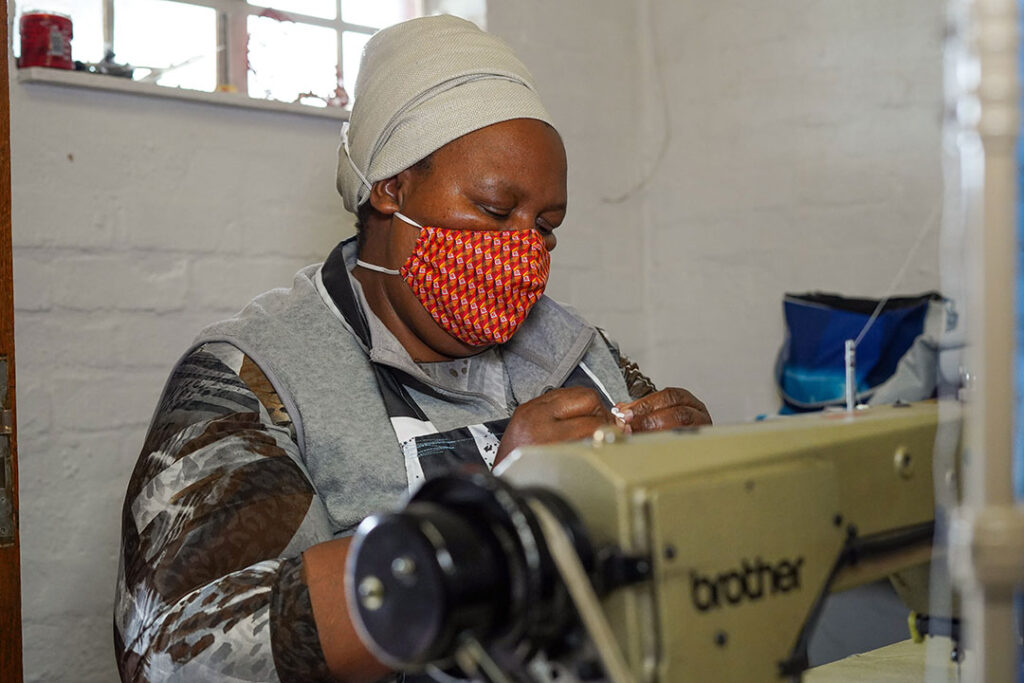ADF STAFF
As the COVID-19 pandemic continues to grip South Africa, public health experts agree there’s one reliable way to stop the spread of the virus and protect people: wearing a mask.
At Cape Town’s Sakhulwazi Women’s Hub in Philippi, seamstresses sew thousands of colorful cloth masks for UbuntuCare to protect their neighbors.
Each mask represents an international effort to halt the spread of COVID-19 in South Africa, which has the continent’s largest number of infections. The $660,000 project brings together the Women’s Hub, the British High Commission in Pretoria, the U.S. Agency for International Development (USAID), and UbuntuCare, a partnership between the Western Cape provincial government and local health groups.
For marketing and distribution, the UbuntuCare project works with Project Last Mile (PLM), a public-private partnership that uses Coca-Cola’s expertise in managing supply chains to help African nations distribute medical supplies to hard-to-reach communities. Project Last Mile operates in 10 countries, many of them in southern Africa.
Project Last Mile has worked with USAID since 2016 to provide chronically ill South Africans with medications they need to live.
“PLM’s long-standing relationship with USAID and knowledge of the local context meant that we could respond fast to this important need,” Adrian Ristow, Project Last Mile’s director based in Port Elizabeth, told ADF. “Given the impact of COVID-19 on the health system, supporting this drive to ensure PPE [personal protective equipment] availability is improved is vital for our more general support of health systems strengthening in South Africa.”
South Africa’s Western Cape province suffered the most cases and deaths early in the outbreak, though it lately has been overtaken by Gauteng province, home to Johannesburg.
With cases still rising, however, cloth masks have become a vital component of the public health effort to reduce COVID-19’s impact on the population. Cloth masks help block the liquid droplets that carry virus particles when someone breathes, coughs or sneezes.
The international effort has employed 130 seamstresses to make 100,000 masks. For each pack of UbuntuCare masks sold, another pack is donated to people who are at high risk of infection.
“For the U.S. government, successful partnerships make all the difference,” USAID Deputy Administrator Bonnie Glick said during the U.S. Embassy South Africa’s October 6 online project announcement. “We believe that USAID must work across public and private sectors, bringing stakeholders together to tackle global problems.”
Project Last Mile uses Coca-Cola’s business network to help small groups like Sakhulwazi Women’s Hub get its masks into local retail shops where people can buy them without having to go to health clinics.
Western Cape Health Minister Dr. Normafrench Mbombo said the project puts masks in the hands of vulnerable people, especially in densely populated communities where social distancing is difficult. The international partnership helps provide masks to people who may be unable to buy them, she said.
Rose “Mama Rose” Makosa founded Sakhulwazi Women’s Hub in 2006 to improve the lives of women in the Philippi community. The money earned from sewing masks helps women buy food for their children and brings electricity to their homes, she said.
Makosa said the Women’s Hub shut down when South Africa went into lockdown early in the pandemic. The hub’s women suffered without work.
“I was so happy when the Ubuntu masks came in,” she said. “We were hungry, and we had nothing. Then the women started working.”

